Thoughts for the Month
The Jesus I know is no cold, hard Iron-Christ; nor does Jesus deserve to be reduced to smug, glib and uncompassionate irrelevancies when the real meaning of His love is what people need so desperately.
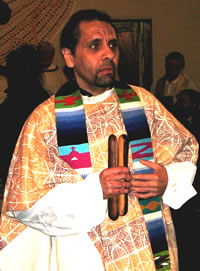 What an amazing event! What joy and pride was on people’s faces! Gratitude for the artists who created this wonderful mural! We were welcoming the Message Stick which will travel to Alice Springs in Oct.
What an amazing event! What joy and pride was on people’s faces! Gratitude for the artists who created this wonderful mural! We were welcoming the Message Stick which will travel to Alice Springs in Oct. 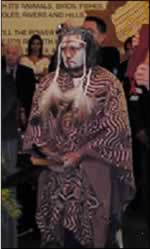 Here were the Pope’s words to Aboriginal people 20 years ago to welcome the message stick, visitors and the parishioners. Especially breathtaking was the joy in the Aboriginal people as they viewed the mural and there was a sense that the first people of Australia were speaking loudly and clearly. Let us hope that we can all hear their cry for justice, that we can all stop and listen to what Aboriginal people are saying to us. That we can all recognise the deep Spirituality in their culture, showing respect and acceptance in the gift of this ancient culture which has been part of the landscape for over 40,000 years.
Here were the Pope’s words to Aboriginal people 20 years ago to welcome the message stick, visitors and the parishioners. Especially breathtaking was the joy in the Aboriginal people as they viewed the mural and there was a sense that the first people of Australia were speaking loudly and clearly. Let us hope that we can all hear their cry for justice, that we can all stop and listen to what Aboriginal people are saying to us. That we can all recognise the deep Spirituality in their culture, showing respect and acceptance in the gift of this ancient culture which has been part of the landscape for over 40,000 years.

Some of Frank Cain’s words spoken at Redfern

The Mural is a symbolic artistic gesture of the discernment of God’s beautiful face in creation. It conveys the words of the Vicar of Christ, or Christ’s representative, the late Pope John Paul II, stating that the Aboriginal people make up part of the Church of this country and recognizes their Catholicism as well as their own unique spirituality.
The Church herself in Australia will not be fully the Church that Jesus wants her to be until you (the indigenous Australians) have made your contribution to her life and until that contribution has been joyfully received by others
Salvation is not necessarily obtained through dogmatic rules and regulations. It can be obtained through caring for the sick, serving the poor, the needy, the oppressed, providing a voice for the marginalized, the down and out, the fringe dwellers and the outcasts. And providing basic human care and resources to people in need, as well as empowering and encouraging people to be independent and acknowledging “the human soul” in that respect. In John Paul II’s words “The greatest value to be achieved …. Is respect for the dignity and growth of the human person”.
We are in fact liberal minded Catholics with a profound devotion to Christ through his teachings and through the Eucharist. And we ask that the Church recognizes and respects the Mural for its theological and spiritual symbolism, its cultural nature and theme of reconciliation.
Clare’s Reflection
be free where you are
I hold my face in my two hands.
No, I am not crying.
I hold my face in my two hands
to keep my loneliness warm.
two hands protecting
two hands nourishing
two hands preventing
my soul from leaving me in anger
Tich Nhat Hanh
The Liberating Energy
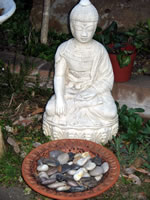 To take care of my anger I first go back to my breathing, and look deeply inside me. Right away I notice that there is an energy called anger in me. Then I recognize that I need another kind of energy to take care of this anger, and I invite that energy to come up to do that job. This second energy is called mindfulness. Every one of us has the seed of mindfulness within us. If we know how to touch that seed, we can begin to generate the energy of mindfulness. With the energy of mindfulness, we can take good care of the energy of anger.
To take care of my anger I first go back to my breathing, and look deeply inside me. Right away I notice that there is an energy called anger in me. Then I recognize that I need another kind of energy to take care of this anger, and I invite that energy to come up to do that job. This second energy is called mindfulness. Every one of us has the seed of mindfulness within us. If we know how to touch that seed, we can begin to generate the energy of mindfulness. With the energy of mindfulness, we can take good care of the energy of anger.
 When people grow and become rooted in love and in God, they are ready to take upon themselves
When people grow and become rooted in love and in God, they are ready to take upon themselvesevery attack,
temptation, vexation,
and painful suffering willingly and gladly,
eagerly and joyfully
like the prophets
You flee from care and throw off fear
when you more and more forsake you mothers
and depart farther and farther from the womb
And do not be afraid to cut yourself off from your fathers,
People should not feel bad if others are angry with them but only if they merited the anger
Prompts service among brothers and sisters
In that way one creature
Sustains another.
One enriches the other,
And that is why
All creatures are interdependent.
justice and peace kiss.
We have to run into peace,
We do not begin in peace.
What is born of God
seeks peace.
The person who runs and runs,
Continually running toward peace,
Is a heavenly person.
Even the heavens
are continually running
and in their running
are seeking peace.
ed by Matthew Fox
A Human Encounter
(A sculpture from Ruanda)
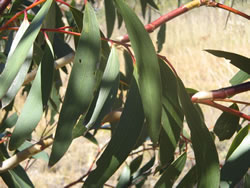 Two Persons meet.
Two Persons meet.
They have time for each other.
They share what they have and what they need.
But the sharing is free of any condescension.
Rather, there is an approach ‘from below’
Nothing is imposed.
Rather, there is a plea, please take
Neither of them looks at the vessel.
What is important is the encounter between the two persons.
They both look at each other
The one who gives does not just hold out the vessel,
She gives of herself.
The other one does not just receive the gift
but also receives the person
The giver becomes the gift,
while still remaining an open vessel.
Giving and receiving are one.
Giving and receiving,
exchange and encounter,
gift and mission.
Excerpts from Epiphanies
Judy Atkinson, of Jiman and Bundjalung descent
I‘ve read deeply about spirituality and I want to make the difference between what I call religion and spirituality. I think religion is man-made. What I did is that I retreated from all of those man-made systems and institutions and started to find the essence of my own spirituality, and I found that more deeply through my relationship with country, with people. I think there’s a deep sense of spirituality in people generally, in children, in the natural world around us.
Thomas Moore says ‘The soul is the place of deepest feeling; the soul is the place of deepest feeling’, and I have a difference between my own thinking, between what is spirit in us, we are body, mind, spirit, and soul; the soul is the place of deepest feeling.
And then I was told by an old Aboriginal woman that in fact we have three souls, the ego soul, which is the way we engage with the physical world around us; our ancestral soul, that links us to those ancestral beings, the long line of people who make us who we are, all of those, and I’m talking now of my German-ness, my Anglo-Celtic-ness and my Aboriginality. And the third soul is our totemic soul, the relationship we have with the natural world, and they give me spiritual sustenance, all of those.
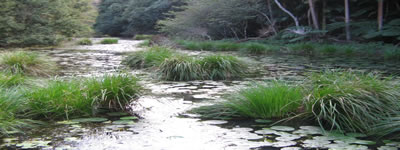
Didiri was written by Miriam Rose Ungunmerr in 1988 and she calls it the Aboriginal gift to the Nation. Dadirri is a special quality, a unique gift of the Aboriginal people. It is inner, deep listening. It’s something that I need in my life to listen to at all times. It talks about for example the right people must be present when we have ceremonies, that we’re not threatened by silence. She uses words that open the door to non-Aboriginal people to come to us, to sit and listen with us and that we can together learn from each other. I think they’re the most beautiful words I’ve ever heard, ever read, ever listened to, and I use them every day now in my teaching practice at the post graduate level in the university. You have a ceremony around them.
Rachael Kohn: Well Miriam Rose’s explanation of Dadirri appears on Father Eugene Stockton’s book, The Aboriginal Gift – Spirituality for a Nation, and there she actually combines Aboriginal spirituality with some Christian beliefs, saying Dadirri is where God or Jesus is found. You’ve mentioned that you use Didiri in your teaching; is it a spiritual practice for you?
Judy Atkinson: Dadirri for me is a spiritual practice, and my teaching is also a spiritual practice. I may be running a Masters Indigenous Studies Wellbeing, or an undergraduate degree in Trauma and Healing but I actually believe life is a spiritual practice. And so Dadirri provides me and provides the students that come into the course a kind of benediction or a sense of here we are together, teacher and taught, learning together, about how we should restructure our lives, how we should change our lives, the things that we need to know to change who we are as a people, to be on this journey, this continual journey of change.
Rachael Kohn: Judy, you also came up with a program which you write about in Trauma Trails. It’s a program of healing called I think, ‘We Ali’. And that means fire and water. Can you explain what that is and how it works?
Judy Atkinson: When I started working on my PhD in the community, we were running workshops and some of the people who were involved in those activities were people from the Wappaburra, the islands, the Great Keppel Islands, and the Jurumba people from the coast in Central Queensland around the Yeppoon, Rockhampton area, and we were looking for something that would describe, some of us would describe what we were doing. And so we sat and looked at the Wappaburra language and we found those words ‘We’ means ‘fire’ and ‘Ali’ means ‘water’ in the Wappaburra language.
What I came to understand that there was so much anger held in the body of people, and they felt so unwell, that if we could work with that anger, the fire of that anger, and I talk a lot about sitting in the fire, as we develop a deeper knowing about ourselves, and then prepared to stay with the pain of that knowledge, so we can transform it. And ‘ali’ means water, and the grief that comes with that. What I want to do now is link that work to the work of Alice Miller, who tried to understand what makes truly violent human beings in societies.